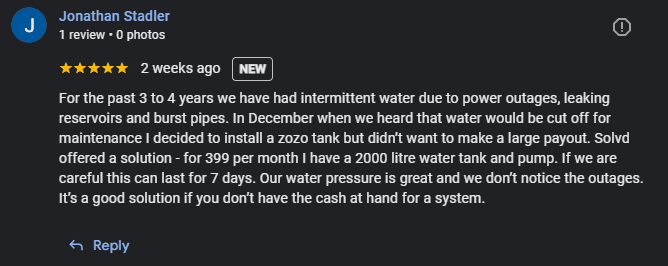Choosing the Right Water Filter for Borehole: A Comprehensive Guide
Why Borehole Water Needs Proper Filtration
While boreholes offer a private, sustainable source of water, groundwater often contains invisible threats such as bacteria, nitrates, heavy metals, and other contaminants that can pose serious health risks if consumed untreated. Even water from your own private supply isn’t automatically safe for drinking consumption. The importance of safe water free from solids and ensuring the safety for drinking and not just baths or the garden is our guarantee to you.
With Solvd you are covered for all filters as long as there is an agreement in place. We will install configure, and manage the housing for your solution and keep you connected to the municipal line for emergencies. Our backup will flow directly into your home keeping your taps full and geyser heated.
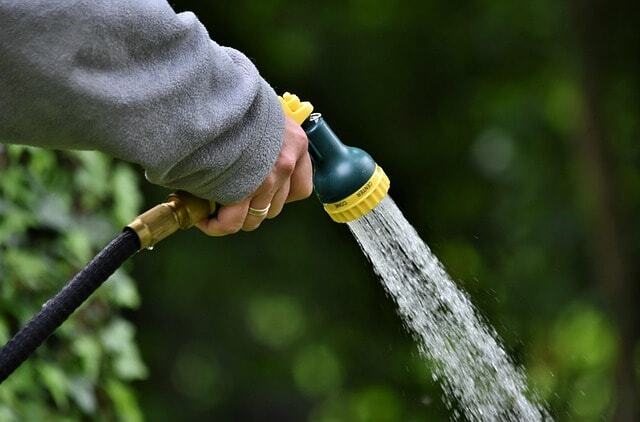
Borehole water may appear clear but can harbor harmful microorganisms and chemical residues that pose health risks, including digestive issues, skin irritation, and chronic illness. Proper filtration is crucial for families relying on borehole water. Often older plumbing installations utilized Galvanised piping which has shown high levels of corrosion over time. Adding a filter outside the house may filter the water before it gets in, but alternatives may be required at the tap to avoid consumption with this water.
Contact Solvd for our range of products from Tanks and Filters to all-in-one products to make sure you are equipped for any eventuality in South Africa.
Protecting Your Family and Water Source
You can't put a price on the importance of family safety. The water for your consumption must provide for the removal of all unwanted chemicals. Our supplied products provide protection using common filtration methods such as sediment traps, activated carbon cartridges, and reverse osmosis systems. Routine maintenance, such as filter replacements and servicing, sustains performance and equipment longevity. Tailored services based on water analysis, pH values, and bacterial monitoring keep water safe and dependable.

Filtration as a Long-Term Investment
Investing in a reliable borehole filtration system ensures peace of mind by safeguarding health, extending appliance lifespan, and reducing reliance on bottled water. Proper filtration delivers clean, safe water every day.
Understanding Your Private Water Supply
Whether your borehole water comes from a deep drill excavation, private spring, rainwater collection, or a private well, each source presents unique qualities and challenges. Borehole water, rich in minerals but often containing bacteria and organic particles, requires thoughtful filtration to be safe for drinking and daily use.
Private water supplies symbolize self-reliance but demand ongoing care through regular maintenance and targeted treatment plans. Rainwater, while soft and low in minerals, can introduce debris and microbes, making filtration essential.
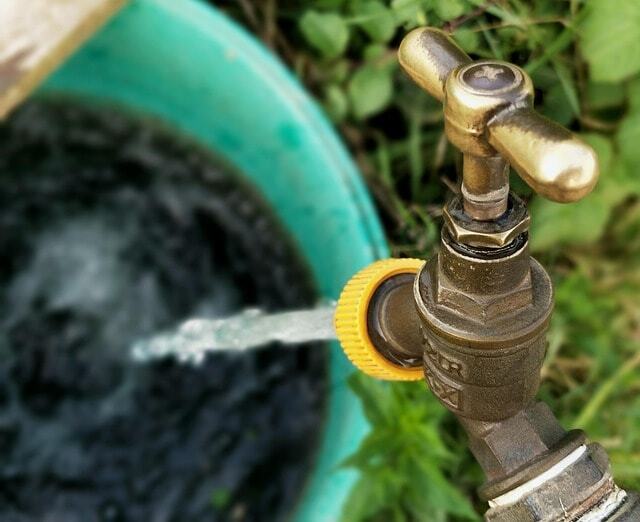
What’s in Your Borehole Water goes in your drinking water.
Contaminants and impurities such as iron, magnesium, ions, bacteria, and sediments affect taste, safety, and plumbing. Bad taste or odor often signals deeper issues like microbial contamination or pH imbalance, which can cause corrosion and damage to plumbing and appliances.
Proper filtration balances pH, removes contaminants, and secures infrastructure. Regular checks such as: filter changes, system flushes, and water diagnosis, is essential to keep water clean and pipes guarded.
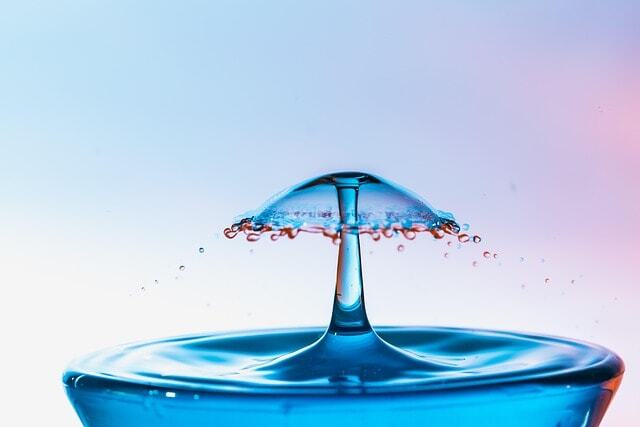
Choosing A Suitable Filtration System
Different sources and specific contaminants require different filter products and methods. Carbon filtration installations improves taste and smell by adsorbing organic compounds. Sediment filters trap silt and debris that can damage pumps or clog appliances.
Comprehensive systems may include ultraviolet (UV) treatment to sterilize microbial threats in your borehole water without chemicals. These technologies can be integrated into a single system, adapting to seasonal changes or shifts in water composition.
Selecting the right system means understanding your water’s makeup through lab examinations or expert consultation to choose methods that meet your quality goals and support long-term wellbeing.
Advanced Filtration Techniques
Advanced filter methods like ion exchange and reverse osmosis remove a wide spectrum of impurities, including iron, manganese, and heavy metals that standard filters miss. Layering multiple methods, such as ion exchange following filtration or reverse osmosis paired with UV sterilization, provides maximum filter coverage and meets health and safety standards.
Regular filter upkeep is vital to maintain efficiency and prevent wear. Properly maintained, these systems serve as long-term defenders against contamination, delivering safe, drinkable water consistently.
Water Treatment and pH Adjustment
Purifying water also involves adjusting what is present. Water treatment and pH balancing ensure water meets safety standards and supports your homes plumbing equipment and is safe for the family. Borehole water often leans the ph to be more acidic, which can corrode plumbing fixtures and shorten system lifespan. Adding alkaline substances neutralizes acidity and balances your ph.
Treatment plans should be tailored to the purpose, whether for domestic tanks, commercial irrigation, or industrial purification. Properly treated water quietly supports your home, business, and wellbeing.
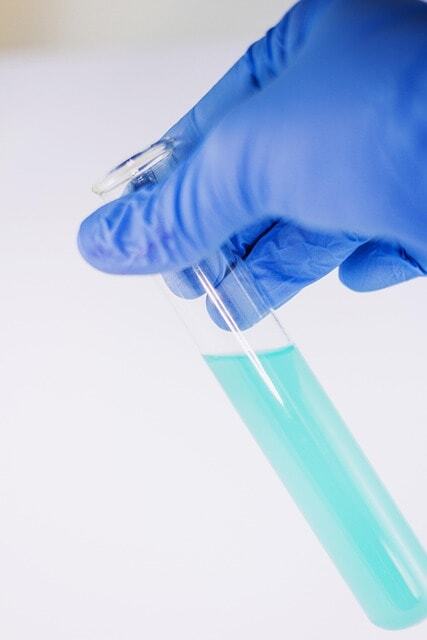
Technologies like UV sterilization offer chemical-free microbial elimination. Combined with sediment, carbon, or reverse osmosis filtration, these systems create robust purification strategies, especially useful for borehole users facing high bacterial content or seasonal water quality shifts. Chlorine removal ensures consistent taste, smell, and safety throughout the system.
Choosing the right mix starts with taking a sample of your current private water supply, enabling configuration of a purification strategy aligned with your quality goals. Expert guidance helps design your filtration architecture from start to finish.
Consistent upkeep ensures optimal performance. Partnering with professionals provides warranties, performance checks, and scalable upgrades, offering peace of mind as your system grows with your needs.
Conclusion: Securing Your Water Quality
Clean water is a daily reassurance. Choosing the right borehole water filtration system safeguards health, preserves plumbing, and promotes peace of mind. From basic filters addressing large particles to advanced purification meeting strict standards, your approach should reflect your water’s unique composition.
Understanding water quality and treatment options lets you build a strategy for consistent performance and dependable results. Regular servicing keeps your system responsive and your borehole water safe.
A reliable borehole filter setup is more than a technical asset, it’s a promise of wellbeing, comfort, and care for home or workplace.
FAQs: Your Questions Answered
How do I filter my borehole water?
Begin with a professional water examination to identify contaminants in your private water supply. Use a staged filtration system that filters for the following:
Sediment filtration for particles and debris
Activated carbon filters for taste and odour
Reverse osmosis or ion exchange for dissolved metals and minerals
Optional UV sterilization to kill bacteria and pathogens
Tailored solutions based on your water profile deliver the best results.
Which water filter is suitable for borehole water?
Suitability depends on borehole water content. For high sediment levels, sediment filters combined with reverse osmosis work well. For microbial contamination, UV sterilizers or chlorination may be needed. Activated carbon improves taste and removes organics. Comprehensive systems often layer these technologies.
How do you purify borehole water for drinking?
Safe drinking water typically involves:
Pre-filtration (sediment, sand, carbon)
Advanced filtration (reverse osmosis or ion exchange)
Disinfection (UV sterilization or chlorination)
This multi-step approach removes particles, chemicals, microbes, and dissolved contaminants. Our experts provide Professional scoping, installation, servicing, and support ensure ongoing safety.
Do you need other products to filter borehole water?
Yes. Borehole water often contains minerals, bacteria, and contaminants making filtration a requirement to secure plumbing, appliances, and health. Even clear water can pose risks or cause long-term illness without proper filtration.
Customer Testimonials
Our water storage and water filtration systems have supplied over 100 happy customers in the last few months we have been active. We go above and beyond
for our customers ensuring quality solutions, a range of products and as many storage tanks as you need. Check our Google reviews or more happy feedback.
